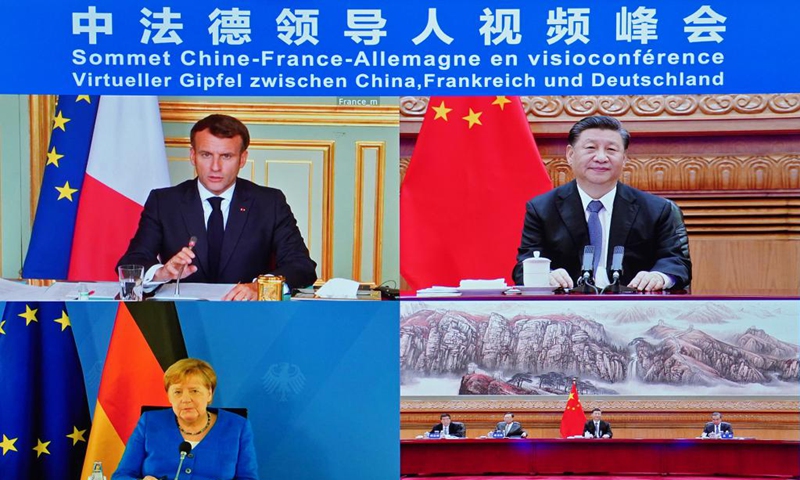China-EU interactions show promise, despite Washington's wedge attempts: Global Times editorial

Chinese President Xi Jinping holds a virtual summit with French President Emmanuel Macron and German Chancellor Angela Merkel in Beijing, capital of China, July 5, 2021.(Photo: Xinhua)
Chinese President Xi Jinping held a virtual summit with French President Emmanuel Macron and German Chancellor Angela Merkel on Monday. This is the second summit in three months of the leaders of these three countries. This sends a clear signal that China and France, Germany have the strong will to further develop their relations with each other, leaders of these three countries will commit to achieving the goal, and shape and guide the international community's expectations of China-EU relations.
China-EU relations in the first half of this year witnessed some twists and turns, especially conflicts over human rights issue. Symbolic sanctions were imposed on each other. The European Parliament has halted the EU-China Comprehensive Agreement on Investment in May in an attempt to extract concessions from China. This formed a rare stalemate in China-EU relations. This is clearly something that Washington likes to see. The Joe Biden administration has been urging Europe to cooperate with US efforts to crack down on China. It has made human rights a consensus issue of US and European policies toward China.
But Washington will have a hard time expanding that consensus issue indefinitely. Xi, Macron and Merkel discussed various topics including China-EU cooperation, major-country relations, multilateralism, international trade, anti-epidemic cooperation, global vaccine supplies, and a series of other issues. They also exchanged views on Africa-related issues. The content of this summit was very rich, showing the wide range of areas China-EU relations encompass.
It is conceivable that the leaders of the three countries do not lack of mutual understandings and common language on these issues. The fact that the leaders of the three countries have had two virtual meetings within three months shows that there is a lot of room for them to work together and the foundation of China-EU relations is now very solid.
The close ties between the US and Europe clearly do not create a zero-sum game and exclusivity in terms of China. There are some basic realities that Washington cannot alter.
For example, there is no fundamental geopolitical conflict between China and the EU. Cooperation between Beijing and the Brussels means great strategic benefits. There is no reason for Europe to undermine such cooperation because of its competition with China. Europe is committed to strategic autonomy, and relations with China are one of the most important arenas for upholding that autonomy.
Ideological differences exist between China and the Europe, but it's a pretentious posture to highlight them in strategies. It's crazy to let the ideological differences dominate China-Europe relations. The diplomatic elites in Europe are not so stupid.
With the changes in the global power structure, countries of Old Europe's dependence on US hegemony is declining. They are unlikely to solely rely on the US for their prosperity and security - in contrast to what Japan and Australia are doing. The geopolitical foundation that drove Europe to make major self-interest sacrifices for US hegemony no longer exists.
The development of relations between China and the Europe is on a normal track, and it's natural that differences have occurred. The European Parliament is now showing a "bad temper" against China. Yet China and the EU have a real and strong willingness to manage and control differences. The US now is attempting to reinforce relations with Europe. It's not a natural result of the bilateral relations development. But it is forcibly pushed by the US for the purpose of dealing with China. It's difficult for the US and Europe to fully align their interests in this regard. They may even go in the opposite direction. Therefore, after Washington has done something easy, it will soon find that it will be pretty difficult to continue to rope the Europeans in its anti-China campaign.
Time will gradually show the stamina of the China-Europe relations in the complex environment. What China wants is pure cooperation that does not target any third party. Such cooperation won't cause worries and could withstand setbacks. By contrast, the strengthened alliance relations that the US is pursuing are aimed at China. The US will thus be exhausted.
No matter how close US-Europe relations appear, Washington will disappointedly find from time to time that Europe will sit together again with China to discuss cooperation. There is an objective reality that cannot be ignored: both China and the Europe are playing games with the US.
